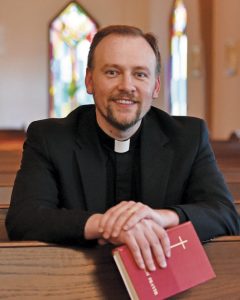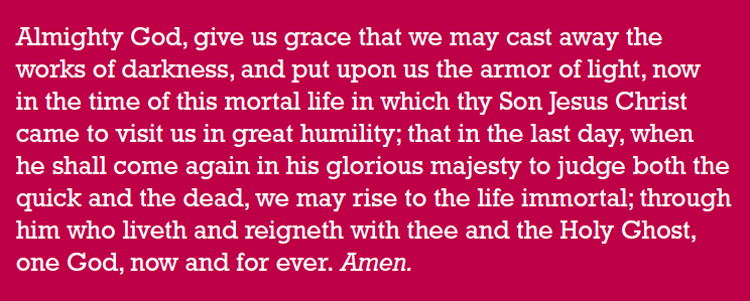By Father Jonathan Kell
Preparing Your Heart for the Season
For decades, Christians have become increasingly concerned by the commercialization of Christmas. It seems that each year the stores begin the holiday shopping season earlier and earlier.
 What had been a call to witness anew the miraculous intervention of God on behalf of sinful man through the birth of His Son has been commercialized. What began in the humility of a manger in Bethlehem has become a garish display of materialism. And so, many Christians have called for Christ to remain or be put back in Christmas.
What had been a call to witness anew the miraculous intervention of God on behalf of sinful man through the birth of His Son has been commercialized. What began in the humility of a manger in Bethlehem has become a garish display of materialism. And so, many Christians have called for Christ to remain or be put back in Christmas.
Churches that are liturgical, that is, those that utilize a historically established ritual in their worship, follow a calendar that is distinct. In our church, we use the 1928 Book of Common Prayer (BCP), which arranges scripture readings and prayers for particular days or seasons.
There are eight seasons in the church calendar, the first being Advent, followed by Christmas, Epiphany, Lent, Easter, Ascension, Pentecost, and Trinity. Advent has been forgotten by many Christians, but Advent may be a remedy to our concerns about the commercial hijacking of Christmas.
The English word “Advent” stems from the Latin meaning coming or arrival. “Advent” has been applied for centuries to the season of the year when Christians prepare to celebrate the first coming of our Lord Jesus Christ through His Nativity. Thus, traditionally in the church, Advent is known as a season of preparation and penitence.
Scripture teaches that fasting should proceed feasting (e.g., Exodus 19:9 -25). So, before the more joyful celebration of Christmas, we examine our lives, and attempt to obtain a fresh sense of our sins, mistakes, and shortcomings, stirring up a desire in ourselves for forgiveness and renewal.
Preparation of the heart is at the core of our worship in Advent. It is a time to set spiritual resolutions for the rest of the year, purging bad habits and taking on good ones. We are encouraged to restrain the typical festivities that overwhelm the first three weeks of December to prepare ourselves for the glorious news of the birth of Christ.
The prayer appointed for Advent reads:

Notice that this prayer not only talks about Christ’s first coming, but also His second coming “in the last day.” Therefore, Advent is not only a preparation to commemorate Jesus’ first coming but also His coming in judgment. Advent is a call to obey Jesus’ command to “watch” and “pray.” (Luke 21:36).
But obedience to Christ and repentance do not come naturally to us. It is only by the grace of God and the gift of the Holy Ghost that any is able to turn to Jesus in repentance and faith. For this reason, Advent is not only a season to prepare to commemorate Jesus’ first coming or a season to prepare for the coming judgment of our Lord, but also an opportunity to reflect upon the ways in which Christ comes to us even now.
The grace of God comes to us in the reading of Holy Scripture, in the preaching of the Word, in prayer, in the grace of Holy Communion, in the labors of the ordained ministry of the Church, and the presence of the Holy Spirit. Although Jesus has ascended to the right hand of the Father, He has not left us alone. The babe of Bethlehem comes to us now to enable us to watch and pray for the day of our death or His return in glory.
A common devotional method by which to persist in prayer and employ the grace of God is the use of an Advent Wreath.
Traditionally, the wreath is made of five candles. Three are violet symbolizing royalty and penance. The fourth candle is rose, a sign of hope in looking to Our Lord’s arrival. On each of the four Sundays preceding Christmas, churches and families light a candle accompanied by prayers of repentance and Scripture reading in preparation for the coming of Jesus. On Christmas Eve, a white candle in the center of the wreath called the Christ Candle is lit to announce our Lord’s arrival.
Christian symbols, such as Advent wreaths, serve as reminders of the many ways in which Jesus has come, continues to come and will come to us. But if we are to truly restore Christ to Christmas we must know Jesus and turn to Him in repentance and faith by “cast[ing] away the works of darkness” and putting on “armor of light.”
Fr. Jonathan Kell is Rector at St. Stephen’s Anglican Church, a Parish of the Reformed Episcopal Church. He can be reached at 601.992.4317.